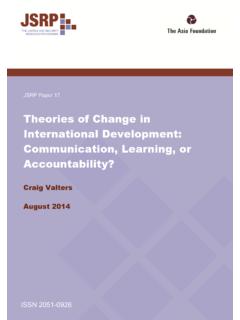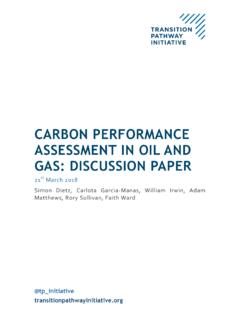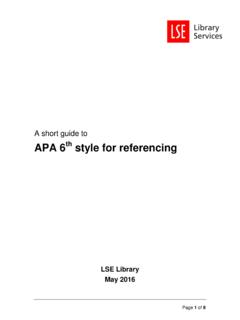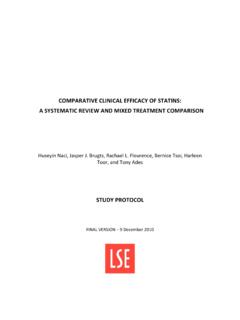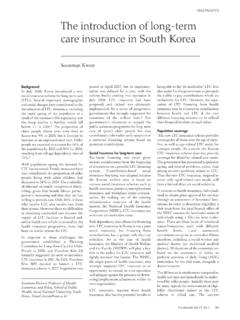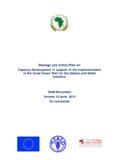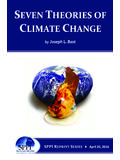Transcription of Antoine Dechezleprêtre and Misato Sato - LSE Home
1 Policy briefNovember 2014 The impacts of environmental regulations on competitivenessAntoine dechezlepr tre and Misato SatoThe Grantham Research institute on Climate Change and the Environment was established in 2008 at the London School of Economics and Political Science. The institute brings together international expertise on economics, as well as finance, geography, the environment, international development and political economy to establish a world-leading centre for policy-relevant research, teaching and training in climate change and the environment. It is funded by the Grantham Foundation for the Protection of the Environment, which also funds the Grantham institute for Climate Change at Imperial College London.
2 It is also supported by the Global Green Growth institute through a grant for US$ million ( million) to fund several research project areas from 2012 to 2014. More information about the Grantham Research institute can be found at: in Seoul, Global Green Growth institute (GGGI) is an intergovernmental organisation founded to support and promote a new model of economic growth known as green growth . The organisation partners with countries to help them build economies that grow strongly and are more efficient and sustainable in the use of natural resources, less carbon intensive, socially inclusive and more resilient to climate change. GGGI s experts are working with governments around the world, building their capacity and working collaboratively on green growth policies that can impact the lives of millions.
3 More information about the Global Green Growth institute can be found at: | 1 The impacts of environmental regulations on competitiveness Contents ContentsExecutive summary 31. Introduction 52. What is competitiveness? 63. The empirical evidence 104. Conclusion: advancing the debate on competitiveness effects 18 References 202 | The impacts of environmental regulations on competitiveness The authors and acknowledgements The authorsAntoine dechezlepr tre is a Senior Research Fellow and Head of the Energy, Technology and Trade research programme at the Grantham Research institute on Climate Change and the Environment, London School of Economics and Political Science, as well as the Centre for Climate Change Economics and Policy.
4 His work deals principally with the impact of environmental and climate change policies on businesses, in particular on the development and the international diffusion of clean technologies. His research has been published in international scientific journals in the field of applied microeconomics, environmental economics and energy economics. He has worked as an external consultant for the OECD Environment Directorate, the UK Committee on Climate Change, the French Environment and Energy Management Agency (ADEME), International Centre for Trade and Sustainable Development (ICTSD) and the French patent office. He holds a PhD in Economics from Ecole des Mines de Paris (France).
5 Misato sato is a Research Officer at the Grantham Research institute on Climate Change and the Environment, London School of Economics and Political Science, as well as the Centre for Climate Change Economics and Policy, where she conducts ex-post analysis of climate change and energy policies. Her research evaluates the impact of existing polices on regulated companies economic performance, and also explores the design of policies to aid the low carbon transition of energy intensive industries. Misato holds a PhD in Environmental Economics from the London School of Economics and Political Science, an MSc in Environmental and Resource Economics from University College London, and an MA Joint Honours in Economics and Chinese from the University of Edinburgh.
6 Misato also worked as a Research Assistant at the Faculty of Economics, Cambridge would like to thank Milan Brahmbhatt, Baran Doda, Carolyn Fischer, Matthieu Glachant, Colin McCormick and Dimitri Zenghelis for extremely helpful comments on an earlier version of the paper. Financial support has come from the Global Green Growth institute , the Grantham Foundation for the Protection of the Environment, as well as the UK Economic and Social Research Council through the Centre for Climate Change Economics and Policy. The views expressed in this paper represent those of the authors and do not necessarily represent those of the host institutions or funders. | 3 The impacts of environmental regulations on competitiveness Executive summary Executive summary Environmental regulations make a small difference to productivity and employmentEnvironmental regulations can reduce employment and productivity by small amounts, in particular in pollution- and energy-intensive sectors, at least during the transitory period when the economy moves away from polluting activities and towards cleaner production processes.
7 Job effects are more likely to occur within countries, where relocation barriers are low, than across borders. This suggests that government policies encouraging labour mobility, such as flexible labour markets, affordable housing and lifelong training, can help reduce or offset the costs of environmental regulations. Over the longer run, when macroeconomic adjustments, geographical and sectoral reallocation are factored in, job effects are even smaller than in the short run. Environmental regulations only marginally affect international competitivenessThere is little evidence to suggest that strengthening environmental regulations deteriorates international competitiveness.
8 The effect of current environmental regulations on where trade and investment take place has been shown to be negligible compared to other factors such as market conditions and the quality of the local workforce. However, the impact could increase in the future if efforts to control pollution diverge significantly across countries. Emerging research comparing environmental efforts in different countries will play a key role in being able to assess and prevent adverse impacts on trade and investment in the benefits of environmental regulations often vastly outweigh the costs The costs of environmental regulations need to be weighed up against the benefits they provide and which justify those regulations in the first place.
9 The benefits are often important and severely underestimated. For example, the estimated health benefits from the Clean Air Act in the United States are two orders of magnitude greater than the employment costs of the policy. This indicates that including job losses in cost-benefit analyses for environmental regulations is unlikely to make them unviable. Future research should systematically compare the costs of environmental regulations with their regulations induce innovation in green technologiesThere is ample evidence that environmental regulations induce innovation in clean technologies and discourage research and development in conventional (polluting) technologies.
10 Thus, environmental regulations can help economies break away from a polluting economic trajectory and move to a clean | The impacts of environmental regulations on competitiveness Executive summary Switching to green technologies can have economy-wide benefitsAt the firm level, green innovations developed to reduce the cost of environmental regulations do not seem to increase firms profits enough to fully offset the private costs of regulation. However, there is evidence that low-carbon innovations induce larger economic benefits than the dirty technologies they replace because they generate more knowledge in the economy, which can be used by other innovators to further develop new technologies across various sectors of the economy.
